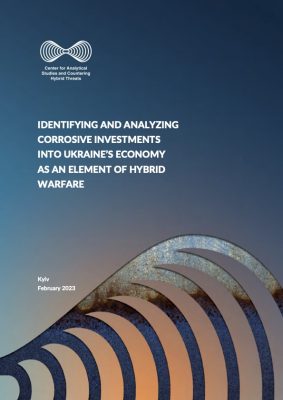Executive Summary

Economic warfare is a special theater in which the aggressor tries to inflict fatal damage on the economy of the victim country, using all available tools as much as possible. There are two ways of waging economic warfare: “collision” with the victim’s economy and “penetration” into it. Within these ways, various methods can be applied, some of which become systems during the project.
“Collision” implies measures which are aimed at weakening the economy of the victim country without establishing control over its enterprises. Measures are aimed at stopping or complicating the flow of goods and technologies from the victim country to the aggressor country, or in the opposite direction.
“Penetration” into an economy implies establishing ownership or control of its enterprises, and corrosive capital is the most insidious method. It involves direct or indirect investments in enterprises in order to harm a victim country’s economy and national interests, and sometimes to the benefit of the aggressor’s own economy. This ultimately has negative consequences for the victim country. Ukrainian exports of raw titanium, for example, are controlled by Russia, providing the aggressor material needed to produce weapons and military equipment used in an open war against Ukraine.
In other words, corrosive investments are investments in an economy that pursue not economic, but political goals, including destroying or subjugating the victimized state.
At first sight, the targets of corrosive investments are particular enterprises. But wider goals include destroying certain sectors of the economy and achieving political goals. The real goals of an aggressor become clear at the final stage of a specific operation, when preventing destructive consequences is difficult, and in certain cases, impossible.
Corrosive investments are investments in an economy that pursue not economic, but political goals.
In the 30 years since Ukraine’s independence, out of more than 1,500 strategic enterprises about 42% have been liquidated or are in bankruptcy. The most vulnerable areas include manufacturing (in which about 50% of active companies have been liquidated), mining industry and quarry development (about 47%) and scientific and technical activities (about 35%).
Amid the presence of internal factors, such as unprofitability and corruption amongst domestic elites, research reveals the corrosive influence of the Russian Federation on both particular enterprises and entire industries, which were either destroyed or taken under the control of the aggressor.
From 2001 to 2014, the extraction and enrichment of titanium in Ukraine was actually under the monopoly control of a pro-Russian oligarch and the output was used to satisfy the needs of the Russian Federation. Even after the first phase of Russia’s open invasion of Ukraine in 2014, when the state returned part of its production facilities, the aggressor improved its methods of influence, which allowed it to maintain covert control over the industry.
The hybrid influence of the Russian Federation in the oil refining industry led to just one of six oil refining enterprises able to function as of 2014, and it was unable to source crude oil from the Russian Federation. The industry was destroyed in four stages: inhibition of Ukrainian production of raw materials by dumping exported versions at low prices; stoppage of oil refining at enterprises, over which control was previously established by the Russian Federation; stopping the pumping of raw materials to other Ukrainian oil refineries; and countering the diversification of oil supplies to Ukraine from other countries.
The liquidation by a pro-Russian politician of the only producer of offset paper in Ukraine at that time caused not only the increase of Ukraine’s dependence on Russian imports of this product, but also obstacles in the work of Ukrainian publishing houses. At the same time, conditions were created for an increase in the flow of Russian printed materials, which contributed to a negative influence on Ukrainian society.
If the destruction of a Ukrainian enterprise can cause harm to the victimized country, Russia uses the method of establishing hidden control over this enterprise through the owners or top management of the enterprise (the research provides an example of a strategic enterprise in the energy industry).
The conducted research revealed that the main method of Russian influence on a victim’s economy, corrosive investments, is used in combination with other methods, such as penetration into the top management of enterprises without obtaining corporate rights, the termination of supply of strategic raw materials, or damage to infrastructure.
Based on the research materials, the project team provided a number of recommendations to the authorities regarding the timely detection of hidden corrosive investments in the economy of Ukraine useful to the Russian Federation, and the leveling of their destructive influence, and the improvement of state regulation and protection of strategic enterprises.
Published Date: February 28, 2023
